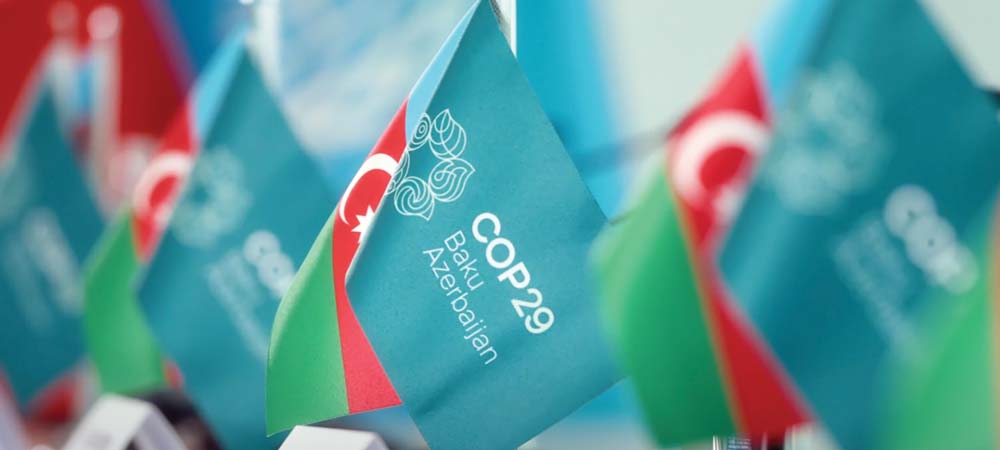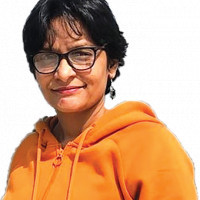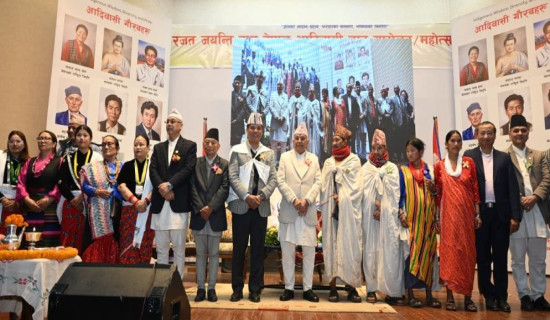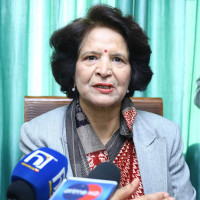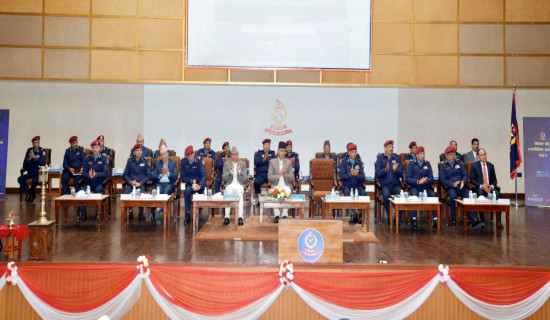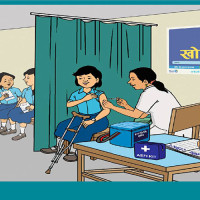- Monday, 9 February 2026
Experts question Nepal’s capacity to utilise climate fund
Kathmandu, Nov. 17: The 29th Conference of the Parties (COP29) to the UN Framework Convention on Climate Change (UNFCCC) is underway in Baku, Azerbaijan. The summit has brought together around 72,000 delegates from 190 countries to address critical climate challenges and mobilise trillions of dollars in financing for global climate projects.
Nepal, as one of the least developed countries, is actively participating in the negotiations and various climate and finance-related events. The country aims to highlight its unique challenges, including the severe impacts of climate change on its mountainous ecosystems and to advocate for enhanced climate finance mechanisms to address these vulnerabilities.
President Ramchandra Paudel, who returned to Nepal on Friday, delivered a national statement at the formal opening of the ‘World Leaders Climate Action Summit’ on November 11. In his address, he underscored Nepal’s vulnerabilities to climate change and drew international attention to recent monsoon-related disasters, such as those in Melamchi, Mustang, Kanchanpur, Thame and the Kathmandu Valley.
Every year, the head of the nation participates (Prime Minister or President) in the conference to highlight the challenges the country faces, primarily due to anthropogenic climate change. The recent devastating floods and landslides have also been attributed to the impacts of climate change, with post-disaster research confirming their link to human-induced climate activities.
Researchers from Nepal, India, Sweden, Australia, the United States and the United Kingdom collaborated on a post-disaster study to assess how human-induced climate change influenced the likelihood and severity of the extreme rainfall that triggered devastating landslides and floods in Nepal.
“This study will help present Nepal’s climate challenges on the international stage and strengthen its case for climate finance,” said Manjeet Dhakal, a climate analyst and expert advisor to the Minister for Forests and Environment, Ain Bahadur Shahi Thakuri.
Nepal’s participation in the COPs
Nepal has participated in all the COP meetings since the 1992 Earth Summit, which took place in Rio de Janeiro, Brazil. The summit led to the adoption of the UN Framework Convention on Climate Change (UNFCCC) in 1994, laying the foundation for the COP meetings. The Earth Summit in 1992 was a significant milestone in global environmental governance, said Batu Krishna Uprety, former Joint Secretary and Chief of the Climate Change Management Division, Ministry of Environment (then), and former Team Leader of the National Adaptation Plan (NAP) formulation process
Uprety, who attended 11 COPs regularly from 2006 to 2016 representing the government, said that Nepal participated in all meetings and COPs, right from the adoption of the Convention in New York in 1992, the Kyoto Protocol during COP 3 in 1997, and the Paris Agreement during COP 21 in 2015. Nepal made statements in the high-level segment of almost all COPs. The President of Nepal made a statement at COP 24 at Katowice (Poland) in 2018, and three Prime Ministers made statements at Copenhagen in 2009, Glasgow in 2021 and Dubai in 2023.
According to Uprety, between 2013 and 2016, Nepal offered its services as the chair of the LDC Coordination Group (2013 to 14), LEG (2014 to 15), and Adaptation Fund Board (2016). During the period, a lot of programmes and policies have been formulated. “We have given more focus to adaptation, where we contributed less than 1 per cent to the greenhouse emissions,” he said.
“We discussed financial support for adaptation strategies such as early warning systems, coastal protection and urban green spaces. Significant progress has been made in adaptation and mitigation efforts since Nepal began participating in these initiatives,” he said.
For instance, in 2016, Nepal secured US$ 2.95 million for the National Adaptation Programme (NAP). Numerous policies and plans have since been developed to implement these programmes at the local level.
“However, while we seek funds internationally, we often neglect implementing these programmes at the grassroots level and fail to utilise the funds we receive properly. Almost 50 per cent of the budget allocated for the NAP was frozen due to insufficient trained human resources and a lack of capacity to implement the budget effectively. Before requesting additional funds, we need to focus on detailed planning within the country - identifying where the funds will be invested and how they will be utilised,” Uprety said.
“The most vulnerable populations are not receiving the benefits of these funds, while unused budgets are being returned annually. This raises questions at the international level about our capacity to utilise the funds effectively,” said Uprety.
Loss and damage, a growing concern since 2010, has emerged as a critical agenda item for Nepal. Uprety stressed the need to address irreversible climate impacts, particularly on water resources and agriculture, which are vital for the survival of vulnerable nations like Nepal.
According to Dhakal, the Loss and Damage fund was formally established at last year’s COP 28 in Dubai. But the journey to secure loss and damage funds is still a long way to go. The first meeting of the Loss and Damage board is going to be held in February, 2025 in Australia. While acknowledging the historical significance of COP 28 for LDCs, he added that a substantial amount of work remains to be done.
Funds secured, challenges remain in implementation
Recently, during COP 29, an agreement was signed between the Global Environment Facility (GEF) and Nepal to implement two major climate resilience projects, amounting to around US$ 10.5 million.
The first project, Managing Watersheds for Enhanced Resilience of Communities to Climate Change in Nepal (MaWRiN), will receive US$ 9.2 million in funding from the GEF. This initiative focuses on the Marin watershed area in Sindhuli district, according to Nabaraj Pudashini, Joint Secretary at the Ministry of Forest and Environment, who shared the update from Baku, Azerbaijan.
The second project, Capacity-building Initiative for Transparency (CBIT), funded with US $1.65 million from GEF, will focus on enhancing Nepal’s capacity to meet reporting requirements under Article 13 of the Paris Agreement, he informed.
Experts highlighted that securing funds is not Nepal's primary challenge, rather, the real issue lies in investment and effective implementation. The government has received substantial funding for various programmes under the Ministry of Forest and Environment.
For instance, the Building Resilient Chure Region project, approved by the Green Climate Fund (GCF) in 2019, was granted US$ 39.9 million to adopt climate-resilient land-use practices and restore ecosystems. However, as of 2024, the disbursements from this fund include US$ 2.4 million in 2020, US$ 5.5 million in 2022, and US$ 6.2 million in 2024, reflecting delays in full fund utilisation.
Similarly, the government received around US$ 27.4 million for the Gandaki River Basin Project, approved in 2020, to enhance the climate resilience of vulnerable communities and ecosystems in the basin. However, despite securing the funds, challenges persist in effective investment and implementation. These issues stem from a lack of strong political commitment and adequately trained human resources.
Criticism of COP and questions about country’s leadership
Senior journalist Rajendra Dahal remarked that Nepal's participation in COP meetings has yielded mixed results. While some have been successful, others have fallen short. He noted that from the Kyoto Protocol in 1997 to the Paris Agreement in 2015 were largely productive, with steady progress being made. However, their effectiveness seems to have declined in recent years.
“The COP has been taken over by polluters. For instance, last year’s COP in Dubai, a major oil-producing nation, and this year’s COP 29 in Azerbaijan, a significant oil-trading country, highlight this shift. These conferences no longer serve the planet’s interests but have become platforms for self-serving groups. This trend is deeply discouraging,” he said.
When discussing the country’s participation in international climate negotiations, officials often attend these meetings, with sponsorships covering their trips. However, it is rarely seen or heard that they play a crucial role in the negotiations or bring tangible outcomes from these meetings, he said.
On November 8, 2024, BBC News released a secret video that raised concerns over the integrity of the COP29 climate conference in Azerbaijan. The footage revealed Elnur Soltanov, the chief executive of Azerbaijan's COP 29 organising team, discussing potential fossil fuel deals with an individual posing as a prospective investor.
In the video, Soltanov spoke about ‘investment opportunities’ in Azerbaijan's state Oil and Gas Company. This revelation sparked widespread criticism, with many questioning the role of fossil fuel interests in a conference aimed at addressing climate change.
Writer and journalist Ramesh Bhusal stressed that COP meetings are global platforms where every country should present a clear agenda and demonstrate strong leadership. While it is not the case that Nepal is entirely inactive, some delegates actively participate in negotiations and meetings, the country still struggles to affirm the leadership it should, he said.
“Nepal has secured significant support from these meetings,” he said, “but the government remains focused only on participation rather than achieving meaningful results. Most delegates cannot effectively engage in negotiations. They simply attend, observe, and return without making any substantial contributions, Bhusal, who is also in Baku, said.
This year, Nepal has planned to spotlight the pressing issues of mountains and the impacts of climate change at the COP 29 conference. The country will advocate for practical solutions to minimise these effects and call for the protection of vulnerable communities and ecosystems.
Nepal’s agenda will focus on key areas, including climate financing, mountain-specific vulnerabilities, loss and damage redressal, technology transfer and capacity building.
With the participation of Nepal’s head of state, the country aims to make a significant impact on this global platform. A special emphasis will be placed on highlighting urgent climate issues from the perspectives of mountainous nations and Least Developed Countries (LDCs), seeking solidarity and actionable commitments.

